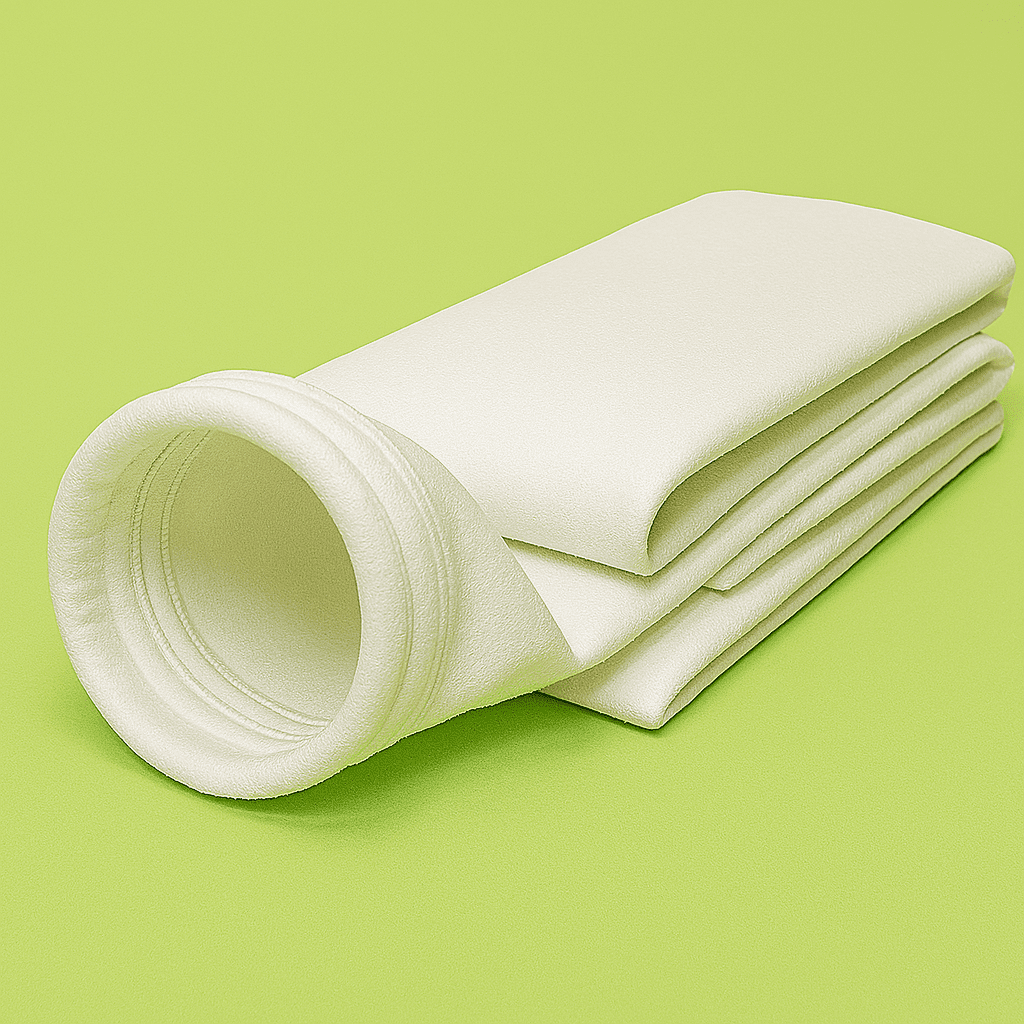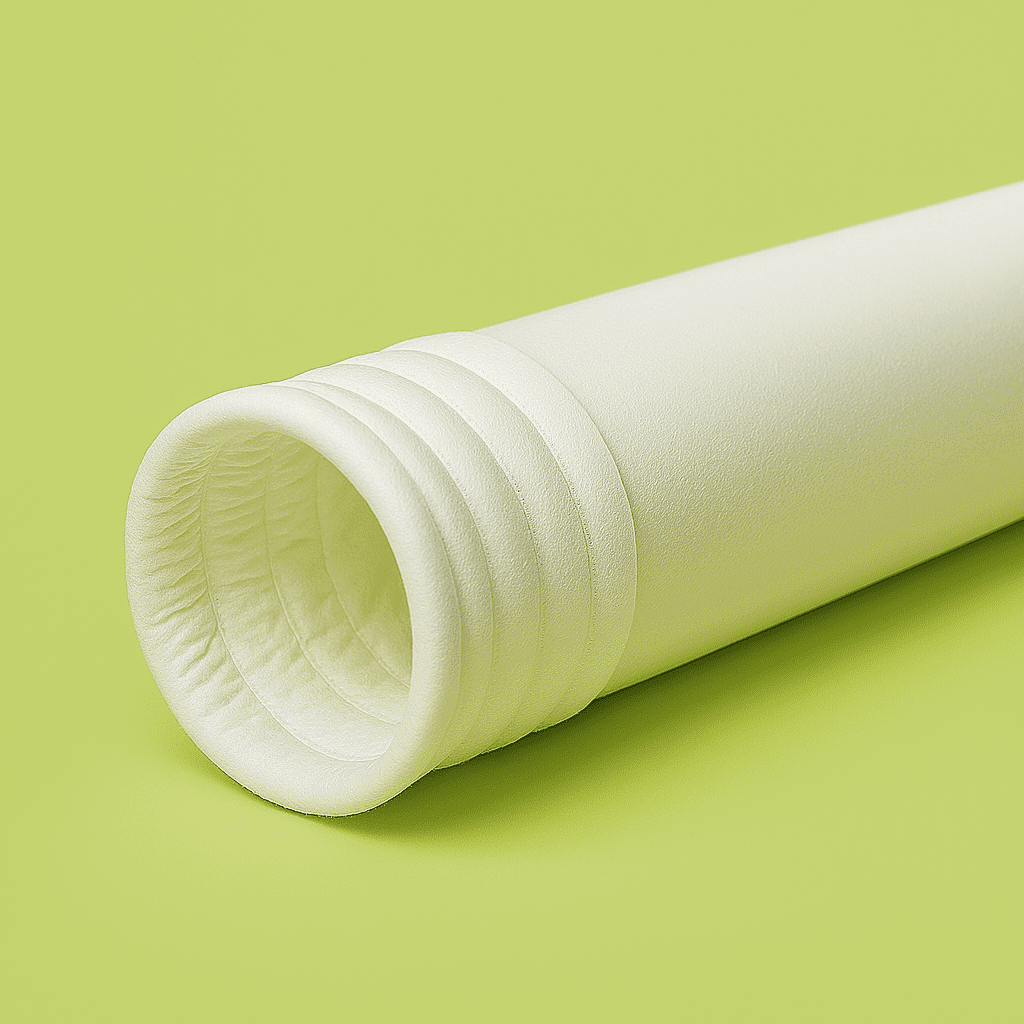Polyester Needle Felt Filter Bag
- Homepage
- Filter Bag
- Polyester Needle Felt Filter Bag
Polyester Needle Felt Filter Bag Features
| CONTENT | 100% POLYESTER |
| INNER TEXTURE | POLYESTER |
| WEIGHT | 525 g/m² ± 5% |
| AIR PERMEABILITY | 11,000 – 14,000 lt/dm²/hour (Dp:200 Pa) |
| THICKNESS | 2.0 mm |
| TENSILE STRENGTH | Warp: 150 kgf/5 cm - Weft: 190 kgf/5 cm |
| SURFACE TREATMENT | CALENDER AND GLAZE TREATMENT, WATER AND OIL REPELLENT HYDROPHOBIC IMPREGNATION |
| OPERATING TEMPERATURE | CONTINUOUS 150°C DRY TEMPERATURE |
| ACID RESISTANCE |
MODERATE
|
| ALKALI RESISTANCE |
WEAK
|
| HYDROLYSIS RESISTANCE |
WEAK
|
| SOLVENT RESISTANCE |
EXCELLENT
|
| OXIDATION RESISTANCE |
EXCELLENT
|
Polyester Filter Bag Production
Polyester filter bags—commonly known as needle-punched polyester felt bags—are among the most widely used filtration elements in industrial applications. Their high mechanical strength, cost-efficiency, and chemical resistance make them a reliable solution across numerous sectors including cement, metal, wood processing, and chemical manufacturing.
How Polyester Filter Bags Are Manufactured
The production process begins with needle punching polyester fibers into a dense, nonwoven filter fabric. This fabric is then treated with hydrophobic and oleophobic solutions to make it resistant to water and oil. To enhance cleaning performance, one side of the fabric undergoes a calendering process (also referred to as glazing), which smooths the surface and prevents dust from adhering.
Once the surface treatments are complete, the fabric is rolled and cut to size. Each filter bag is stitched using durable chain-stitch machines. The bottom is sealed with a reinforced cap, while the top is fitted with an elastic or snap-band collar to ensure a tight fit around the filter cage. The bags are then cleaned, quality-checked, trimmed, and packaged for delivery.
Durability and Technical Suitability
Polyester filter bags are available in multiple weights, including 400, 500, 525, 550, and 600 g/m², depending on your system’s airflow, dust load, and process needs. These bags offer excellent resistance to abrasion, tensile stress, and mechanical wear, making them a preferred option in heavy-duty operations.
When selecting a polyester filter bag, it’s essential to evaluate several factors, such as:
The distance between the dust source and the filter unit
System air volume and pressure
Dust type, size, and concentration
Exposure to acids, solvents, and oxidizing agents
Operating temperature and humidity
While polyester is an ideal option for systems operating up to 150°C, high-temperature applications—such as asphalt or foundry operations—may require advanced materials like Nomex (meta-aramid) or P84.
Expert Support from Fora Filter
Choosing the right filter media directly impacts your system’s efficiency, safety, and maintenance needs. At Fora Filter, we combine years of production expertise with hands-on engineering support to help you make the most accurate choice.
Our technical team evaluates your system’s specifications, operational conditions, and filtration challenges to recommend the best filter bag configuration for your application. We can also offer on-site analysis when required.
Industries Using Polyester Filter Bags
Due to their thermal tolerance and chemical resistance, polyester filter bags are widely used in:
Iron and steel production
Cement and lime facilities
Wood, MDF, and sawdust collection systems
Aluminum and non-ferrous metals
Foundries and casting operations
Chemical processing plants
Pulp and paper manufacturing
Fertilizer and agricultural input facilities
Thanks to their hydrophobic surface and smooth finish, polyester bags effectively repel wet and oily dust, reduce clogging, and ensure consistent airflow—resulting in extended service life and reduced operational costs.
For reliable product selection, performance optimization, and technical consultation, reach out to the expert team at Fora Filter. We’re here to help you build cleaner, safer, and more efficient industrial systems.


